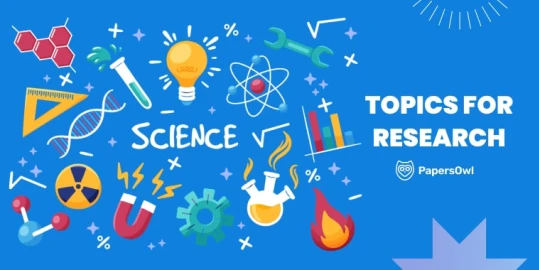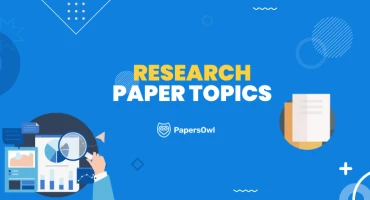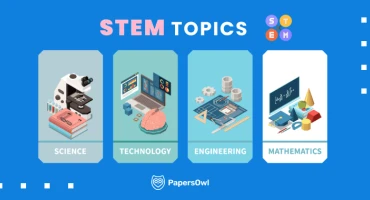Searching for science research topics can feel like exploring a vast universe — these ideas will help you land on a star!
Thus, this guide provides a clear list of ideas suitable for high school students, college learners, and graduate researchers. You can use these topics for a research paper, essay, or experiment.
Key takeaways:
- Access 400+ unique science research topics across levels and subjects.
- Learn about trending topics for 2025, including new discoveries.
- Separate lists for high school, college, and graduate students.
- Find environmental science clusters and emerging areas.
- Quick tips on picking a topic fast and effectively.
For extra guidance on structuring your work, check out essay service to get practical tips and examples.
25 Trending Science Topics for 2025
Looking for a quick list of science research topics? This snapshot covers interesting science topics across multiple disciplines.
These ideas are fresh for 2025 and can spark experiments, essays, or research papers. Students can find topics that match their curiosity and available resources.
- Effects of artificial light on crop development cycles
- CRISPR gene editing to treat rare disorders
- Quantum dots for energy-efficient LEDs
- Predictive modeling in marine species tracking
- Renewable energy impact on urban microclimates
- Brain–computer interface for memory enhancement
- Soil microbiome influence on crop yield
- Ocean acidification and coral bleaching
- Autonomous robots in archaeology surveys
- Microplastics in freshwater ecosystems
- Cosmic energy force effects on galaxy formation
- Solar panel efficiency with nano-materials
- Urban greenery and mental health
- Antibiotic resistance in wastewater
- Exoplanet biosignature detection techniques
- Gene therapy for inherited visual disorders
- AI-assisted early disease detection
- Solid waste handling and circular economy
- Light pollution effects on nocturnal species
- Climate adaptation tech for agriculture
- Neural network prediction of earthquakes
- Fusion energy milestones for grid stability
- Renewable battery chemistries beyond Li-ion
- Crop development under music influence
- Ethical implications of synthetic biology
These topics provide a starting point for science research ideas and allow students to explore research topics with practical value.
Learners can expand on these interesting topics by reviewing existing literature and producing well-structured science research papers.
These ideas also touch on social sciences, connecting human and environmental systems.
How to Pick Your Science Topic Fast?
Choosing a topic doesn’t have to be overwhelming. Here are five simple steps to select cool science topics quickly:
- Match your topic to your interests. Pick something that excites you. Motivation helps you dive deeper into research.
- Check available resources. Ensure you can access the tools, data, or materials needed for experiments.
- Limit the scope. Narrow your topic to fit your assignment length. A focused topic is easier to manage.
- Review existing literature. Look at studies and reports to guide your research. Research shows that starting with current papers improves outcomes.
- Stay motivated. Choose a topic that encourages curiosity. Share ideas with peers to develop your communication skills. This works well for high school students exploring science research projects.
Research Flow (Visual Roadmap)
- Explore topics → brainstorm & map ideas
- Review literature → find credible sources (journals, gov reports, not blogs)
- Define your question → make it measurable
- Design & test → experiment, survey, or model
- Analyze & conclude → connect back to big picture
- Share results → paper, poster, or presentation
Science Research Topics by Level
High School Science Research Topics
High school students often need safe, measurable, and practical ideas for classroom experiments.
These science research topics for high school students focus on simple setups while exploring science topics for high school.
They help learners understand vegetative development, mental health, and environmental science, while connecting to broader social sciences.
- How does music affect plant growth? Measure height daily for 14 days
- Materials: potted bean plants, soil, water, ruler, speaker.
- Plan: Play music for one group and leave the other silent. Compare growth.
- How does sunlight affect leaf photosynthesis? Count bubble release for 7 days
- Materials: water plants (Elodea), glass jars, lamp, ruler, stopwatch.
- Plan: Place plants under different light conditions and measure bubble rate.
- How does sugar concentration affect yeast fermentation? Count CO₂ bubbles for 5 days
- Materials: yeast packets, sugar, warm water, bottles, balloons.
- Plan: Mix yeast with sugar solutions of different strengths and track gas.
- How does water pH affect seed germination? Count sprouted seeds for 10 days
- Materials: seeds, soil, water with vinegar (acidic), baking soda (basic), and a ruler.
- Plan: Water groups with different pH and compare germination rates.
- How does temperature affect metal expansion? Measure strip length daily for 7 days
- Materials: metal ruler/strip, hot water, ice, thermometer.
- Plan: Heat/cool the strip and record length changes with a ruler.
- How does soil moisture affect bean plant growth? Track height for 14 days
- Materials: pots, soil, beans, water, and a ruler.
- Plan: Water plants at different moisture levels and compare growth.
- How does light intensity affect algae growth? Measure cloudiness over 10 days
- Materials: algae culture (pond water), jars, lamp, foil.
- Plan: Place jars at different light exposures and check turbidity.
- How do natural fertilizers affect radish growth? Track height for 15 days
- Materials: radish seeds, compost, coffee grounds, soil, pots, and a ruler.
- Plan: Compare plant growth with different fertilizer treatments.
- How do surfaces affect paper airplane distance? Measure flight distance for 5 trials
- Materials: paper, tape, ruler, different floor surfaces (tile, carpet, wood).
- Plan: Launch planes across surfaces and record the average distance.
- How does exercise affect short-term memory? Test recall scores for 5 days
- Materials: word list, timer, notebook, volunteers.
- Plan: Give one group light exercise before recall tests, then compare with the control group.
- How does temperature affect magnet strength? Count paperclips held for 7 days
- Materials: magnets, paperclips, hot water, ice.
- Plan: Heat/cool magnets and test how many clips they attract.
- How do different liquids affect tooth decay? Track shell changes for 14 days
- Materials: eggshells, cups, water, soda, juice, vinegar.
- Plan: Soak shells in liquids and observe color/texture changes.
- How does recycled vs. fresh soil affect plant growth? Measure height for 14 days
- Materials: old soil, new soil, pots, seeds, water, and a ruler.
- Plan: Grow plants in both soil types and compare results.
- How do sand vs. charcoal filters affect water clarity? Test for 7 days
- Materials: bottles, sand, charcoal, cloudy water.
- Plan: Filter water through both and measure clarity improvements.
- How does ambient noise affect study focus? Track test scores for 5 sessions
- Materials: reading passages, timer, quiet vs. noisy space, volunteers.
- Plan: Have students study in silence vs. with noise, then test recall.
College/Undergraduate Science Research Topics
For college students, research projects require more depth and access to advanced resources.
These science research topics for college students are suitable for research papers and support the writing process.
They cover biological sciences, physical sciences, environmental science, and social sciences, and help students analyze trends like online networking in research contexts.
- Microbiome diversity and its effect on plant growth
- Analysis of water quality in urban rivers
- AI-based classification of plant species from images
- Sustainable power sources adoption in mid-sized cities
- Brain activity patterns during problem-solving tasks
- Soil nutrient analysis for sustainable agriculture
- Impact of social media usage on sleep cycles
- Effects of urban greenery on air quality
- Predictive modeling algorithms in health diagnostics
- Study of pathogen resistance genes in soil bacteria
- Data mining for detecting climate anomalies
- Physiological reactions to stress in sports science experiments
- Behavioral analysis of wildlife in protected areas
- Cognitive performance differences between digital and paper reading
- Neural network models for predicting stock trends
Graduate-Level/Advanced Science Research Topics
Graduate students explore complex problems requiring extensive data and theory.
These scientific research topics focus on advanced research areas, fundamental laws, and potential applications.
Topics include biological sciences, environmental science, physical sciences, ocean acidification, and intersections with social sciences.
Many projects align with initiatives at Stanford University or other research institutions.
- CRISPR prime editing for treating rare genetic disorders
- Quantum sensing to detect subterranean water reserves
- Self-supervised ECG anomaly detection for atrial fibrillation
- Modeling fusion energy integration into existing grids
- Microbiome therapeutics for autoimmune diseases
- Brain–computer interfaces for neurorehabilitation
- Synthetic biology containment strategies and ethics
- Exoplanet biosignature analysis using spectral imaging
- Advanced neural network prediction of extreme weather events
- Soil carbon sequestration under diverse crop rotations
- Ocean acidification impact on shellfish development
- Machine learning for predicting protein folding structures
- Climate adaptation technologies for coastal communities
- Big data analytics for epidemiological studies
- Interaction of dark energy with galaxy clusters
Science Research Topics by Subject
Biology & Biotechnology
Explore living systems through biological science research topics. Students can investigate gene therapy, genetic disorders, or gene expression.
These projects provide practical experience with marine life or immune system responses.
- Gene therapy for inherited disorders
- Immune system responses to new vaccines
- Microbiome effects on plant growth
- Coral reef biodiversity changes
- Gene expression in different environments
- Marine life behavior under climate stress
- Biological impacts of pollution
- Microbial resistance in aquatic ecosystems
- CRISPR applications for disease prevention
- Soil microbiome and crop yield
- Genetic mapping of rare species
- Bioluminescent organisms as bioindicators
- Epigenetic effects of diet
- Plant–microbe interactions in agriculture
- Lab-grown tissue and ethical considerations
Chemistry & Materials
Dive into matter and materials. These science topics to research include chemical reactions, materials science, and individualized therapy. Students can analyze natural and human impacts and apply principles from physical sciences.
- Catalysts for green energy production
- Biodegradable polymer design
- Nanoparticle drug delivery systems
- Effects of pH on chemical reactions
- Material strength in 3D printing
- Precision medicine using chemical markers
- Water purification techniques
- Air quality monitoring methods
- Soil contaminant reactions
- Environmental impact of plastics
- Electrochemical energy storage
- Thermochemical analysis of fuels
- Chemical sensors for pollutants
- Nanomaterial toxicity in ecosystems
- Materials for solar energy efficiency
Physics & Astronomy
Study the universe with research topics in theoretical physics. Students can explore physical science research topics, including quantum mechanics, dark energy, or space exploration. Hands-on simulations of quantum dots or astronomy experiments deepen understanding of physical sciences.
- Quantum computing algorithms
- Effects of dark energy on galaxy formation
- Quantum dots in LED technology
- Planetary motion simulations
- Space exploration trajectory modeling
- Black hole radiation analysis
- Gravitational wave detection
- Physics of solar flares
- Subatomic particle behavior
- Magnetic field measurements in labs
- High-energy cosmic ray detection
- Quantum tunneling demonstrations
- Light polarization experiments
- Asteroid impact modeling
- Thermodynamics in star formation
Earth & Environmental Science
Examine our planet with astronomy topics. Students can explore earth science and environmental science projects, including natural and human impacts, renewable energy sources, and measuring ecological influences.
- Effects of global warming on polar ice
- Sustainable power adoption in urban areas
- Soil erosion monitoring
- Air pollution and vegetative development
- Water quality analysis in rivers
- Deforestation and biodiversity
- Urban green spaces and temperature regulation
- Natural disaster frequency trends
- Carbon footprint of local communities
- Soil nutrient cycling
- Environmental factors affecting crop yield
- Coastal erosion and marine ecosystems
- Climate change models
- Wildlife conservation in urban areas
- Earthquake prediction and mitigation
Computer Science, Data & AI
Explore machine learning, artificial intelligence, and big data analytics. Students can model systems or predict outcomes using scientific fields methods.
- Machine learning for environmental data analysis
- AI in medical diagnostics
- Big data in population studies
- Neural network prediction of crop yields
- Data mining in social sciences
- Algorithm optimization for robotics
- AI ethics and privacy issues
- Predictive modeling for sustainable power sources
- Pattern recognition in genetic data
- Computer vision for autonomous systems
- Deep learning for natural language
- Data security in cloud computing
- AI-assisted scientific experiments
- Computational modeling of ecosystems
- Visualization techniques for large datasets

Neuroscience & Cognitive Science
Study the brain, behavior, and mental processes with science related topics. Students can explore cortisol reactions, community engagement, or gain a deeper understanding of cognition. Many projects link to mental health and social sciences research.
- Effects of sleep on memory retention
- Brain plasticity after learning new skills
- Cognitive load in multitasking situations
- Neural responses to music stimuli
- Social interactions and emotional intelligence
- Stress responses in different age groups
- Decision-making under pressure
- Effects of mindfulness on attention
- Memory recall in virtual environments
- Brainwave analysis using EEG
- Cognitive impacts of digital media
- Learning differences in adolescents
- Neural mechanisms of empathy
- Reaction time and sensory stimuli
- Problem-solving strategies in groups
Health & Medical Science
These topics focus on human health, medical sciences, and personalized medicine. Students can use social science insights to study disease trends, preventive measures, or analyze treatment strategies.
- Impact of diet on cardiovascular health
- Tailored medical treatment for cancer treatment
- Microbial resistance monitoring
- Vaccination awareness and uptake
- Mental health interventions in schools
- Sleep and immune system function
- Human microbiome and disease prevention
- Exercise effects on metabolic health
- Public health responses to pandemics
- Chronic disease management strategies
- Effects of air pollution on respiratory health
- Telemedicine effectiveness in rural areas
- Genetic predispositions to obesity
- Nutrition and cognitive development
- Health literacy and behavior change
Psychology
Psychology explores behavior and mental processes through interesting scientific topics. Students can study mental health, childhood trauma, and social interactions, linking research to the social sciences.
- Effects of childhood trauma on memory
- Social media impact on adolescent mental health
- Cognitive behavioral therapy outcomes
- Stress and academic performance
- Emotional regulation strategies
- Peer influence on decision-making
- Mental health interventions in schools
- Relationship between sleep and mood
- Attention span variations under stress
- Social anxiety triggers and coping methods
- Behavioral patterns in cooperative tasks
- Memory retention techniques
- Impact of family environment on development
- Personality traits and learning styles
- Emotional intelligence and leadership
Engineering & Robotics
Engineering topics involve electrical engineering, renewable energy, and habitat preservation methods. Projects may integrate machine learning, explore physical sciences, or test tools for space exploration, evaluating potential implications.
- Solar-powered robotic vehicles
- Smart grid optimization
- Energy-efficient building design
- AI-assisted robotic surgery simulations
- Conservation methods for urban energy
- Electrical circuit design experiments
- Renewable energy storage solutions
- Robotic arms for lab automation
- Environmental monitoring with sensors
- Machine learning in autonomous drones
- Materials for space exploration
- Robotics for disaster response
- Sustainable transportation technologies
- Energy harvesting from vibrations
- Automation in agriculture
Forensic Science
Forensic projects analyze evidence, human activity, and natural disasters in a controlled setting. Students can apply science research paper topics to simulate crime scene investigations safely.
- Fingerprint pattern analysis
- Soil sample comparisons in crime scenes
- Forensic entomology applications
- DNA evidence interpretation
- Blood spatter pattern analysis
- Trace chemical detection
- Fire investigation techniques
- Human activity reconstruction
- Disaster site forensic studies
- Tool mark comparisons
- Hair and fiber evidence analysis
- Digital forensic data recovery
- Toxicology and environmental factors
- Forensic anthropology in disaster sites
- Chain-of-custody documentation
Cognitive & Behavioral Research
Explore how humans communicate, learn, and interact. Projects develop communication skills, connect to the scientific community, and relate to the social sciences.
- Group decision-making dynamics
- Attention span in multitasking
- Social influence on behavior
- Effectiveness of learning strategies
- Memory retention and recall techniques
- Communication patterns in virtual teams
- Behavioral responses to stress
- Cognitive development in adolescents
- Role of motivation in learning
- Peer collaboration efficiency
- Influence of environmental factors on behavior
- Social norms and compliance
- Brain activity during problem-solving
- Learning retention in diverse settings
- Observational learning in real-world tasks
Behavioral and Social Sciences
Study society, culture, and human behavior. Projects analyze social sciences trends, gather valuable insights, and connect findings to the scientific community.
- Social media usage and attention span
- Urban community parks and community well-being
- Cultural influences on learning outcomes
- Workplace social dynamics
- Peer influence on decision-making
- Gender differences in problem-solving
- Group cooperation in school projects
- Social networks and mental health
- Impact of social policies on behavior
- Community engagement in conservation
- Social factors affecting academic performance
- Communication patterns in multicultural settings
- Behavioral responses to incentives
- Media influence on social attitudes
- Public perception of scientific findings
Environmental Science Deep-Dive
Climate
Explore how climate systems interact with natural and human processes. Students can use these science research paper topics to study extreme events, temperature patterns, and how climate change impacts agriculture and health.
- Urban heat islands in environmental science
- Severe climatic events prediction
- Climate change impact on crop yield
- Climate modeling using physics principles
- Vector-borne diseases in environmental science under global warming
- Global warming mitigation strategies
- Ecosystem services valuation
- Climate-smart agriculture techniques
- Urban community gardens and temperature control
- Ecological footprint reduction plans
- Sustainable management of natural resources under climate change
- Permafrost thaw and greenhouse gas release
Energy
Explore ways to manage renewable energy sources and tackle climate change. Students can research nuclear energy, solar, and wind solutions.
Projects might include measuring storms and heat waves or testing the efficiency of renewable energy systems.
- Solar energy efficiency in urban areas
- Wind turbine power output modeling
- Nuclear energy safety assessment
- Urban heat islands and climate change
- Extreme weather event prediction
- Bioenergy potential from algae
- Renewable energy adoption trends
- Climate change impact on crop yield
- Hydropower efficiency analysis
- Carbon capture experiments
- Energy storage innovations
- Climate modeling using physics principles
Conservation Policy
Investigate natural science topics to understand ecosystems. Students can explore marine ecosystems, marine organisms, and marine conservation. Projects may study aquatic life, habitat protection, or conservation strategies.
Insights from biological sciences and physical sciences connect to the scientific community and inform responses to climate change.
- Coral reef conservation strategies
- Marine organism population studies
- Coastal ecosystem restoration
- Aquatic life and pollution impact
- Mangrove protection techniques
- Biodiversity monitoring in estuaries
- Habitat fragmentation effects
- Impact of overfishing on marine life
- Urban green spaces for species survival
- Soil and water quality for conservation
- Reintroduction of endangered species
- Sustainable fisheries management
Pollution
Study the impact of pollution on human health. Research can cover environmental factors, light pollution, waste management, or antibiotic resistance. Measuring environmental impact helps students connect findings to environmental science and the scientific community.
Projects might include tracking climate change effects on local health.
- Air quality and respiratory health
- Plastic pollution in urban rivers
- Light pollution effects on wildlife
- Antibiotic resistance in water systems
- Noise pollution and stress responses
- Industrial waste management strategies
- Heavy metal contamination in soils
- Environmental factors affecting mental health
- Microplastics in marine ecosystems
- Urban smog and physical activity
- Public health policy evaluation
- Climate change and vector-borne diseases
Ecology
Examine the role of urban greenery in reducing global warming. Students can analyze environmental science policies or evaluate biological sciences impacts on ecosystems. Linking these studies to scientific community efforts highlights strategies to mitigate climate change.
- Urban community gardens and temperature control
- Environmental taxation policies
- Cost-benefit analysis of renewable projects
- Ecosystem services valuation
- Policy impact on biodiversity
- Forest conservation incentives
- Sustainable city planning
- Water resource management policies
- Land-use regulation effects
- Global warming mitigation strategies
- Ecological footprint reduction plans
- Corporate environmental responsibility
Emerging Science Areas in 2025 (30 Topics)
Explore science research ideas in new frontiers. Topics include quantum computing, fusion energy, brain–computer interfaces, and synthetic biology. Students can examine climate change adaptation, artificial intelligence, extraterrestrial life, or other interdisciplinary projects.
- Self-supervised ECG anomaly detection
- CRISPR prime-editing applications
- Quantum sensing for medical imaging
- Fusion energy containment methods
- Microbiome therapy innovation
- Brain–computer interface optimization
- Climate adaptation technology evaluation
- AI-driven climate modeling
- Synthetic biology safety protocols
- Exoplanet biosignature analysis
- Autonomous robotic research labs
- Advanced quantum computing algorithms
- Personalized medicine with AI
- Carbon-neutral fusion reactor design
- Neural decoding for prosthetics
- Microbial ecosystem engineering
- Solar-to-fuel conversion innovations
- Quantum dots for bioimaging
- AI-assisted protein folding research
- Space colonization habitat studies
- Climate-resilient crop design
- Bioethical implications of synthetic life
- Deep learning for astronomical data
- CRISPR for endangered species
- Neural network optimization in robotics
- Fusion plasma turbulence studies
- Human–machine interaction modeling
- Adaptive optics for telescopes
- Regenerative medicine using stem cells
- Predictive analytics for environmental disasters
Science Research Questions
These science research paper topics guide students in forming focused questions. They cover research topics and scientific knowledge and cross multiple disciplines, including physical sciences and biological sciences.
- How do social sciences studies explain behavior changes in online communities?
- Can AI improve early disease detection?
- What factors influence urban heat islands?
- What is the impact of human health studies on reducing infectious disease outbreaks?
- Can gene therapy prevent hereditary disorders?
- What role does quantum computing play in drug discovery?
- How does climate change affect coastal erosion?
- How can environmental science help predict the effects of climate change on urban areas?
- What ethical considerations arise from experiments in biological sciences involving gene editing?
- What strategies in environmental science reduce pollution in freshwater ecosystems?
- Can brain-computer interfaces restore mobility?
- How do vertical farms improve food security?
- What influences coral reef biodiversity loss?
- How does the scientific community share findings to improve global health outcomes?
- Can AI detect patterns in astronomical data?
- How can human health research inform policies on nutrition and exercise?
- What methods best monitor soil health?
- What role does the scientific community play in regulating emerging technologies?
- Can synthetic biology reduce environmental hazards?
- How do changes in biological sciences research methods improve understanding of ecosystems?
Summing Up
The scientific community benefits from systematic research. Students can apply their science research skills to research paper projects in biological sciences, physical sciences, and social sciences.
Engaging in hands-on studies at any level, from middle school to college, builds understanding, innovation, and curiosity, even if you sometimes ask can i pay someone to write my essay when the workload becomes heavy.






